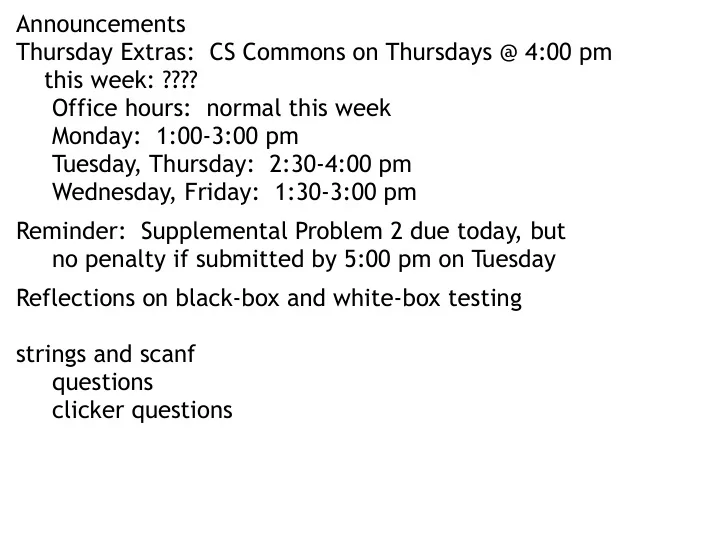

Announcements Thursday Extras: CS Commons on Thursdays @ 4:00 pm this week: ???? Office hours: normal this week Monday: 1:00-3:00 pm Tuesday, Thursday: 2:30-4:00 pm Wednesday, Friday: 1:30-3:00 pm Reminder: Supplemental Problem 2 due today, but no penalty if submitted by 5:00 pm on Tuesday Reflections on black-box and white-box testing strings and scanf questions clicker questions
Clarifications about White-box and Black-box Testing Consider these statements: 1. Black-box Testing only involves looking at the output given for specific inputs. 2. White-box Testing only involves looking at the output given for specific inputs. Which, if any, of these statements is true? A. Both 1 and 2 C. 2, not 1 B. 1, not 2 D. neither 1 nor 2
Clarifications about White-box and Black-box Testing Consider the following program outline: Vote 1: What is the minimum Enter values number of test cases required If (condition 1) for White-box testing? A A. 0-3 else B. 4-6 B C. 7-9 if (condition 2) D. >= 10 C E. cannot tell else D Vote 2: What is the minimum if (condition 3) for Black-box testing? E A. < 8 else B. = 8 F C. > 8 Assume conditions 1, 2 and 3 D. no way to know are independent of each other
Consider the following program that reads 3 characters: #include <stdio.h> int main () { char a, b, c; scanf ("%c%c%c", &a, &b, &c); printf ("#%c#%c#%c#\n", a, b, c); return 0; } A user enters x y z (that is, the letters x, y, z, each separated by a space character; there is no space before the x or after z What is printed? A. compile error B. runtime error C. #x#y#z# D. #x# #z# E. something else
Consider the following program that reads 3 characters: #include <stdio.h> int main () { char a, b, c; scanf ("%c %c %c", &a, &b, &c); // spaces added before %c printf ("#%c#%c#%c#\n", a, b, c); return 0; } A user enters x y z (that is, the letters x, y, z, each separated by a space character; there is no space before the x or after z What is printed? A. compile error B. runtime error C. #x#y#z# D. #x# #z# E. something else
A code segment is to be written The user wants to type the that will read a word (up to 10 word Hello. characters) and print the result. When the code is compiled The basic code progression is and run, either an error occurs or it runs fine: Declaration of str variable scanf ("%11s", str); 6 Votes with these options: printf ("the string is %s\n", str); A. compilation error B. run-time error Five declarations are proposed: C. runs fine 1. char str[15]; 2. char * str; 6 Votes: 3. char word[15]; Vote 1: declaration 1 char * str = word Vote 2: declaration 2 4. char word[15]; Vote 3: 2 lines from code 3 char str [ ] = word; Vote 4: 2 lines from code 4 5. char str [15] = "my string" Vote 5: declaration 5 6. char * str = "my string" Vote 6: declaration 6
A user is to type words on each of 2 lines. The program is to read the first word of each line, and ignore the rest of the input. Assume each word is no longer than 9 characters, and assume the following declarations: char str1 [10], str2 [10], bigstr[100], ch; Two approaches are proposed: 1. scanf ("%9s", str1); fgets (bigstr, 100, stdin); scanf ("%9s", str2); 2. scanf ("%9s", str1); while ((ch=getchar()) != '\n') ; scanf ("%9s", str2); Which, if any, of these approaches works? A. Both 1 and 2 C. 2, not 1 B. 1, not 2 D. neither 1 nor 2
As in the previous slide, a user is to type a word on each of 2 lines. Two more approaches are proposed: 3. int i = 0; 4. int i = 0; do { str1[i] = getchar(); do { str1[i] = getchar(); i++; i++; } } while (!isspace(str1[i])) while (!isspace(str1[i-1])) str1[i] = 0; while ((ch=getchar()) != '\n') ; while ((ch=getchar()) != '\n') ; int i = 0; int i = 0; do { str2[i] = getchar(); do { str2[i] = getchar(); i++; i++; } } while (!isspace)str2[i-1])) while (!isspace)str2[i])) str2[i] = 0; A. Both 3 and 4 C. 4, not 3 B. 3, not 4 D. neither 3 nor 4
Suppose input will contain a name in the first 40 characters of a line, followed by a number. char line [101]; //leaving room for null character char name [41]; int number; Two approaches are proposed reading a line 1. scanf ("%41s %d", name, & number); 2. fgets (line, 101, stdin); strncpy (name, line, 40); name[40] = 0; number = atoi (line+40); Which of these approaches works reliably? A. Approaches 1 and 2 B. Approach 1, not 2 C. Approach 2, not 1 D. Neither 1 nor 2
Suppose you want to read an integer at the start of one line, skip anything else on that line, and then read a double at the start of the next line. int one; double two; #define max 100 char line [max+1]; Two approaches are proposed: 1. scanf ("%d", & one); while (getchar () != '\n') ; scanf ("%lf", & two); Which of these approaches 2. fgets (line, max+1, stdin); works reliably? one = atoi (line); A. Approaches 1 and 2 while (line[strlen(line)-1] != '\n') B. Approach 1, not 2 fgets (line, max+1, stdin); C. Approach 2, not 1 fgets (line, max+1, stdin); D. Neither 1 nor 2 two = atof (line);
Recommend
More recommend